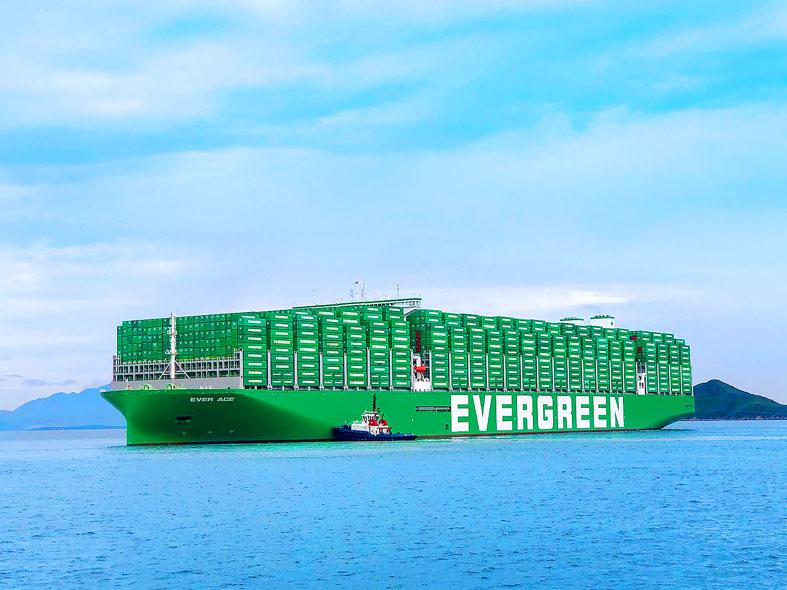Contracts between China’s top state-owned shipbuilding firm and Taiwan’s leading shipping company are likely lowering the costs of upgrading China’s navy, posing security concerns for the nation, a US think tank said on Thursday.
China State Shipbuilding Corp (CSSC, 中國船舶集團有限公司) is a key producer of vessels for the rapidly expanding Chinese People’s Liberation Army Navy, and is thought to be building its third aircraft carrier.
Taiwan’s Evergreen Marine Corp (長榮海運) has purchased 44 vessels from China since 2018, all but two of which were ordered from shipyards that produce Chinese warships, including CSSC, the Center for Strategic and International Studies said in a report.

Photo courtesy of Evergreen Marine Corp
The Washington-based think tank said foreign companies in France and other US-allied countries also buy ships from CSSC, which the US has placed on an investment blacklist for US citizens and companies due to its Chinese military links.
The center said that while there is limited transparency on the flow of foreign capital in China’s shipbuilding industry, “available evidence indicates that profits from foreign orders are likely lowering the costs of upgrading China’s navy.”
It called the foreign contracts “a tangible threat to national security” for some democracies in the region, and said companies should consider US allies South Korea and Japan as alternative shipbuilding partners.
The study included commercial satellite imagery from February showing at least three Evergreen hulls under construction near China’s newest aircraft carrier at CSSC’s subsidiary Jiangnan shipyard near Shanghai.
Evergreen vessels have also been docked next to Chinese navy cruisers and destroyers, it said.
The imagery “suggests there is direct sharing of resources between military and civilian operations at China’s key shipyards,” the center said.
Evergreen said in a statement that all of its container ship projects undergo international bidding, and that its contracts with CSSC’s commercial shipbuilding department were “completely different and separate” from CSSC’s military department.
“We believe the civil commercial ship building activities have nothing to do with national naval projects,” it said, adding that it discloses information about its orders to investors and authorities.
China already has the world’s largest navy, with a greater number of warships and submarines than the US.

US President Donald Trump yesterday announced sweeping "reciprocal tariffs" on US trading partners, including a 32 percent tax on goods from Taiwan that is set to take effect on Wednesday. At a Rose Garden event, Trump declared a 10 percent baseline tax on imports from all countries, with the White House saying it would take effect on Saturday. Countries with larger trade surpluses with the US would face higher duties beginning on Wednesday, including Taiwan (32 percent), China (34 percent), Japan (24 percent), South Korea (25 percent), Vietnam (46 percent) and Thailand (36 percent). Canada and Mexico, the two largest US trading

ACTION PLAN: Taiwan would expand procurement from the US and encourage more companies to invest in the US to deepen bilateral cooperation, Lai said The government would not impose reciprocal tariffs in retaliation against US levies, President William Lai (賴清德) said yesterday, as he announced five strategies to address the issue, including pledging to increase Taiwanese companies’ investments in the US. Lai has in the past few days met with administrative and national security officials, as well as representatives from various industries, to explore countermeasures after US President Donald Trump on Wednesday last week announced a 32 percent duty on Taiwanese imports. In a video released yesterday evening, Lai said that Taiwan would not retaliate against the US with higher tariffs and Taiwanese companies’ commitments to

‘SPECIAL CHANNEL’: Taipei’s most important tasks are to stabilize industries affected by Trump’s trade tariffs and keep negotiations with Washington open, a source said National Security Council Secretary-General Joseph Wu (吳釗燮) arrived in the US for talks with US President Donald Trump’s administration, a source familiar with the matter said on Friday. Wu was leading a delegation for a meeting known as the “special channel,” the Financial Times reported earlier. It marked Trump’s first use of the channel since returning to the White House on Jan. 20. Citing a source familiar with the matter, the Financial Times reported that Minister of Foreign Affairs Lin Chia-lung (林佳龍) was also a part of the delegation. The visit came days after China concluded war games around Taiwan and amid Trump’s

CHIP EXCEPTION: An official said that an exception for Taiwanese semiconductors would have a limited effect, as most are packaged in third nations before being sold The Executive Yuan yesterday decried US President Donald Trump’s 32 percent tariff on Taiwanese goods announced hours earlier as “unfair,” saying it would lodge a representation with Washington. The Cabinet in a statement described the pledged US tariffs, expected to take effect on Wednesday next week, as “deeply unreasonable” and “highly regrettable.” Cabinet spokeswoman Michelle Lee (李慧芝) said that the government would “lodge a solemn representation” with the US Trade Representative and continue negotiating with Washington to “ensure the interests of our nation and industries.” Trump at a news conference in Washington on Wednesday announced a 10 percent baseline tariff on most goods